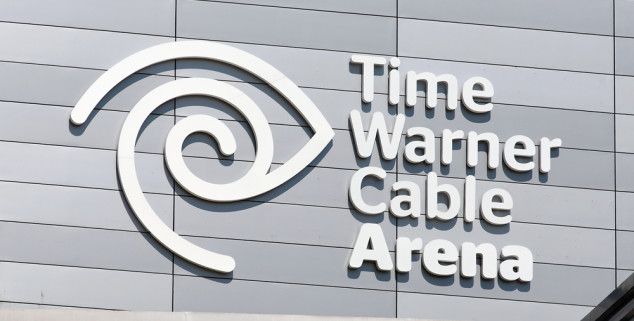News
Cable merger could have big impact on California
 A sports complex with the Time Warner Cable logo. (Photo: Katherine Welles, Shutterstock)
A sports complex with the Time Warner Cable logo. (Photo: Katherine Welles, Shutterstock)Change may be coming to millions of California cable TV and broadband users.
A looming $78.7 billion merger between Time Warner Cable and Charter Communications would affect California’s cable TV and broadband markets, with the new entity, called New Charter, serving nearly four of every 10 customers in the state.
It is the second time in less than a year that California has faced big changes in its cable TV and broadband landscape because of a potential industry merger.
“Speaking strictly from the standpoint of an Assembly member, I think it impacts my district and I am concerned about broadband service in low-income communities,” said Assemblyman Anthony Rendon, D-Lakewood, the chair of the Utilities and Commerce Committee.
If the merger, which entails the sale of Time Warner and Bright House Networks to Charter is approved, the new entity – called New Charter — would have more than 39 percent of the California market, nearly five-fold Charter’s current market presence.
New Charter would be eclipsed in California only by Comcast, which has a 42 percent share, according to industry figures reviewed by Capitol Weekly. Included in the deal is Charter’s purchase of Bright House Netwerks, a company based in the South that serves the Bakersfield area. The complex, three-way deal requires federal approval. Nationally, New Charter would become the second-largest cable provider behind Comcast.
Charter, which serves some 126 communities in California, currently has about 7.6 percent of the California market, serving 126 communities. Time Warner, with the second largest presence in California, has 31.6 percent. Cox Communications, whose service area includes San Diego, has a 14 percent share. Together, other small cable companies have about 4.7 percent of market.
But the Charter-Time Warner merger is generating far less controversy than the Comcast deal – at least so far.
Apart from market share changes, the impacts on customers are uncertain, although there may be an expansion in of out-of-home Wi-Fi and, potentially, mobile voice and data services.
It is the second time in less than a year that California has faced big changes in its cable TV and broadband landscape because of a potential industry merger.
An earlier proposed joining of Time Warner and Comcast ultimately collapsed in April, amid complaints from consumer groups, federal regulators and the Justice Department. That deal, with a $45 billion price tag, would have provided Comcast and its affiliates with an estimated 72 to 80 percent of California’s market. Charter, which has a presence in California and figured in the negotiations, would have left the state in exchange for an increased presence in the Midwest and Southeast.
But the Charter-Time Warner merger is generating far less controversy than the Comcast deal – at least so far.
Industry observers in California say it has a chance of winning regulators’ approval by the end of the year. For one thing, Charter doesn’t own NBC-Universal, and that was a sticking point in the Comcast-Time Warner deal. For another, telephone service is not at issue, which in the earlier proposal drew the attention of state Public Utilities Commission.
“This is a very different transaction,” said Charter spokesman Justin Venech, noting that Charter does not own a broadcast network or a cable network.
Comcast, the largest cable provider, has about 27 million customers across the country, followed by Time Warner with 14 million, Cox Communications with 6.2 million, Charter with 5.9 million, according to industry figures. If approved, New Charter would have about 23.9 million customers nationally.
“From our perspective, we can combine these companies and bring the best of each of them to the customer,” Venech. “We don’t have modem leases, the modems are part of the price of service. We don’t use data-usage pricing. We don’t have data caps. That’s better for the customer.”
For Rendon, the issue comes down to more than data.
“Fairness, jobs and access to information, he said.
Want to see more stories like this? Sign up for The Roundup, the free daily newsletter about California politics from the editors of Capitol Weekly. Stay up to date on the news you need to know.
Sign up below, then look for a confirmation email in your inbox.

Oh, brother…can’t wait for the customer “no service” to kick in with this merger. They’re both terrible now. Combined, this company will be a monster of indifference and we’ll have NO options for escape. Stop mega-mergers for profit and start providing better service for all.